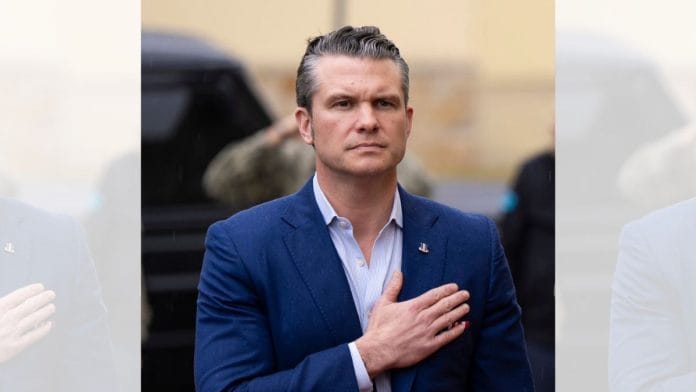New Delhi: The return of Ukraine to its pre-2014 borders before Russia annexed Crimea is an “unrealistic objective” and an “illusionary goal” that will “only prolong the war”, declared US Secretary of Defence Pete Hegseth Wednesday at his first appearance at a NATO meeting in Brussels.
“President Trump has been clear with the American people and with many of your leaders that stopping the fighting and reaching an enduring peace is a top priority. He intends to end this war by diplomacy and bringing both Russia and Ukraine to the table,” said Hegseth at a meeting of the Ukraine Defence Contact Group in Brussels.
The US Secretary of Defence added: “We will only end this devastating war and establish a durable peace by coupling allied strength with a realistic assessment of the battlefield. We want, like you, a sovereign and prosperous Ukraine, but we must start by recognising that returning to Ukraine’s pre-2014 border is an unrealistic objective. Chasing this illusionary goal will only prolong the war and cause more suffering.”
Hegseth went a step further to say Ukraine needed “robust security guarantees” to ensure the war did not begin again but that its NATO membership is not a “realistic outcome” for a negotiated settlement of peace.
The US Secretary of Defence offered the clearest roadmap for the new Trump administration’s thoughts on the war in Ukraine. The third anniversary of the war, which has seen thousands of Ukrainians and Russians die in the battlefields of eastern Ukraine, would be later this month.
The message from the US administration will be a disappointment for Kyiv, which has pushed its 10-point peace plan for a negotiated settlement, including a return to the pre-2014 borders and membership in the North Atlantic Treaty Organisation (NATO).
NATO, the 32-member military alliance, was formed in 1949 with a collective defence clause—an attack on one is an attack on all. Since then, the military alliance has been considered an umbrella for peace for European countries from the threat of the USSR during the Cold War. Since the end of the Cold War, several former Eastern European countries have joined the bloc.
However, Trump, who promised to end the Ukraine war at the earliest, has taken issue with NATO during his terms as President. He has blamed the members of the military alliance for coasting on the strength of the US military. During his first tenure, he made a concerted push to have the member-states of NATO spend a minimum of two percent of its gross domestic product on defence.
In Brussels, Hegseth Wednesday called on NATO countries to increase their defence spending to five percent of the gross domestic product. The US Secretary of Defence clarified that Washington D.C. is dealing with challenges, such as the rise of “Communist China”, and that the Europeans need to spend more on defence.
“Any security guarantee [for Ukraine] must be backed by capable European and non-European troops. If these troops are deployed as peacekeepers to Ukraine at any point, they should be deployed as part of a non-NATO mission, and they should not be covered under Article V,” said Hegseth.
He promised that no US troops would be deployed to Ukraine. The statements by Hegseth mark a change in policy from the previous administration under President Joe Biden, who believed it was up to Kyiv to decide the concessions it was keen on making to achieve peace.
In 2008, NATO first promised membership for Ukraine and reaffirmed the decision in subsequent meetings.
However, Hegseth’s comments pour cold water over Kyiv’s aspirations and potentially make any roadmap for peace more difficult for Ukrainian President Volodymyr Zelenskyy. Zelenskyy has spent the last year working on earning global support for his 10-point peace plan.
On the other hand, the message of no NATO membership for Kyiv and the potential territorial gains for Russia in any negotiated settlement would be good news for Russian President Vladimir V. Putin.
Putin has taken a maximalist position on the war, calling for global recognition of Moscow’s annexation of four Eastern provinces and a halt to NATO membership and limited military capacity for Ukraine.
(Edited by Madhurita Goswami)
Also Read: Sharpening divide over global governance of AI palpable as US, UK snub Paris summit statement






